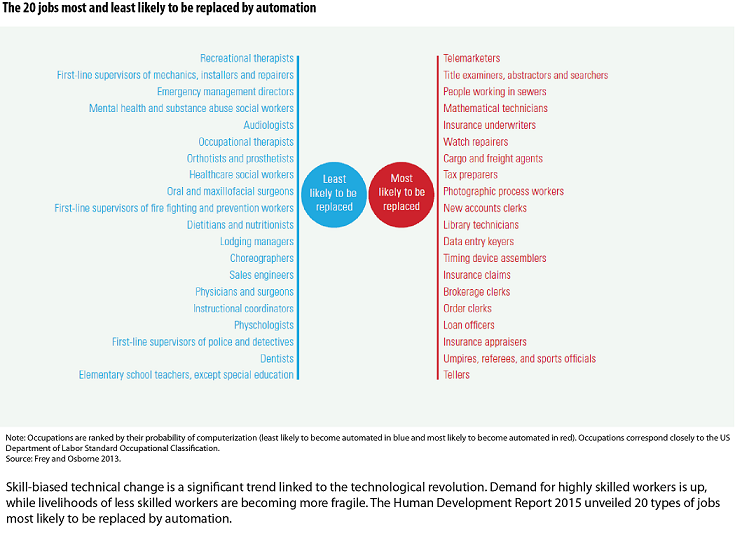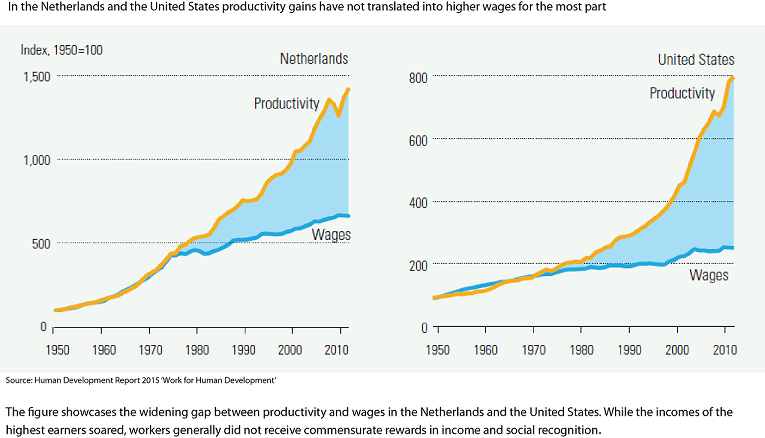What will be the nature of work in future? This million-dollar question is being discussed in cafes, schools and work places around the world right now. Some say –with growing automation and the Fourth Industrial Revolution, many areas of work would extinct; others opine – yes, jobs would be lost, but many more would be created. Some even go so far to predict that the work hasn’t yet been invented for the babies of today. The bottom line is that no one knows for sure what the future holds for jobs, although we can be sure it would be very different. This is an issue which is part of the development discourse at the global, regional, sub-regional and the country level – big or small. This week, 11 countries in the Pacific are discussing, under the auspices of the International Labour Office (ILO), the future of work in their sub-region.
The 2015 Human Development Report on Work for Human Development asserted that globalization and the technological revolution are fast changing how we work and what we do. Globalization brings workers and businesses together in global networks through outsourcing and global value chains. For example, Apple directly employs only 63,000 of the more than 750,000 people around the world who design, sell, manufacture and assemble its products.
Because of the technological revolution knowledge has become central to production. In 2012, trade in knowledge-intensive goods, services and finance - worth nearly $13 trillion – grew 1.3 times faster than labour-intensive goods. The digital revolution has produced new frontiers of work, such as the sharing economy (GrabTaxi), business process outsourcing (UpWork), crowdworking (Mechanical Turk) and flexible working in terms of hours and locations. Technological advances have not only transformed work; they are also engines for new forms of creativity and innovation. Some of the technologies with the highest potential to change how we work include cloud technology, 3D printing, advanced robotics, energy storage and the automation of knowledge work. Even volunteering has changed and it can now be done virtually – online or digitally.
The digital revolution may be associated with high-tech work, but it is also influencing a whole range of other work. Mobile phones now facilitate many aspects of work through a combination of voice calls, SMS and mobile applications. Internet access empowers people to harness their creativity and ingenuity. The digital economy has enabled many women to access new forms of work that better allows them to apply their potential. In 2013, about 1.3 billion women were using the internet. Some have moved to e-trading as entrepreneurs and some are employed through crowdworking or on e-service.
 |
So what would the world of future work look like? It is difficult to know, but we can be sure that the impacts will be positive for some and negative for others. There has never be a better time for workers with high skills, but there has never be a worse time for workers with low or no skill. Occupations like computer specialists, design engineers, physicians and surgeons are less likely to be replaced, while jobs like telemarketers, loan officers, order clerks are most likely to be automated. The digital revolution’s rises in productivity have not yet resulted in an equal rise in pay as many promised. And this has led to rising inequality. Furthermore, new flexible working arrangements, outside of a formal organizational structure, has raised the risk of increasing numbers of workers whose rights are not protected.
 |
The types of work that people do and the ways they do it are being transformed by globalization and new technologies. This is reshaping the ways we think, behave and work. There are unfulfilled promises and new opportunities in the emerging world of work as we move forward. Seizing the future in our digital globalized world is not something to be left to chance – it is a matter of skill and foresight. In such a world, the policies and rules of yesterday might not serve the challenges of tomorrow.
The HDialogue blog is a platform for debate and discussion. Posts reflect the views of respective authors in their individual capacities and not the views of UNDP/HDRO.
HDRO encourages reflections on the HDialogue contributions. The office posts comments that supports a constructive dialogue on policy options for advancing human development and are formulated respectful of other, potentially differing views. The office reserves the right to contain contributions that appear divisive.
Photo: (cc) Eneas De Troya


